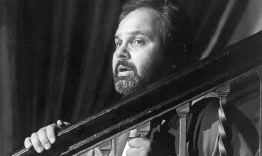THEY ONLY COME OUT at night. They’re known for their ruthless attacks on the innocent, the weak, the unwary. They have a mysterious—some would say evil—power over the wills of others. Doomed to a barren immortality, half-alive at best, they draw their sustenance through the vitality of their victims, so that they may continue their dark pursuits.
St. Nicholas
A Contemporary Theater, Ends September 10
I refer, of course, to drama critics. For if playwright Conor McPherson’s got one thing right in his evening-length monologue, St. Nicholas, it’s that there are probably few people more bitter, more hateful, more inclined to be drawn to the powers of darkness, than burned-out theater critics. (Not that I know any personally.)
It’s a droll, and surprisingly unstated, joke in this twisty-turvy tale of a Dublin writer’s strange encounter with a coven of vampires that there’s more than a slight resemblance between the rapacious undead and the sort of arts writer who’s stopped caring about the art itself, but instead is, in the words of his unnamed protagonist, “famous for all the wrong reasons.” As played by the superb Laurence Ballard, McPherson’s creation is the sort of jovial bastard whose roaring humor and skillful contempt mask a profound emptiness. Having risen to the heights of punditry, reviewing books on the radio and being on a first-name basis with famous directors, he admits that any sort of interest in theater itself has long vanished. All that’s left in his life are the sterile pleasures of the study and a perverse delight in his ability to sabotage the careers of those he appraises.
He has become so debased from his ability to appreciate the good, in fact, that when he is struck by the vital beauty of a young actress playing the title role in a production of Salome, he treats the matter as an affliction and gives the show that most damning of reviews—a middling one. But this act of unkind hubris leads to its own nemesis, as his fascination in her turns to an obsessive infatuation, eventually leading him to follow her company when the show is transferred to London.
For all his admitted sickness of the soul, the Critic is not an intellectual fraud. His dissections of his peers, and the situations that he finds himself in, are resolutely acute. Ballard’s performance taps into the character’s strange virtues, such as his bold and brash lies, his clever schemes, and above all his pitiless self-analysis. In the best British tradition of self-laceration, this is one right bastard who is not about to give himself any breaks.
You might expect such a character to follow the traditional path into self-destruction, but MacPherson’s got other ends in mind, and he approaches them from a strange angle indeed, as the Critic’s trip to London takes him into the service of a group of vampires. It’s this odd twist, more than any other, that reveals the author’s aim—to take a soul apparently damned past the possibility of salvation and give him a miraculous chance of rebirth.
Ballard begins the evening by prowling about the upper levels of the Bullitt Stage, and by the time he finally descends to the main floor, this actor, with his formidable emotional range and personal charisma, has drawn us entirely into his unlikely tale. McPherson’s rambling storytelling could come across as gimmicky or fey from a less talented narrator, but Ballard’s gutsy power not only keeps us listening but acutely aware for the possibility that this odd fable might have a significant moral attached. That it does, one related to its incongruous title, a message regarding charity, and belief, and love. That such a message should come from such a messenger is perhaps the most interesting accomplishment of an unusual, and unusually delightful, evening’s entertainment.








